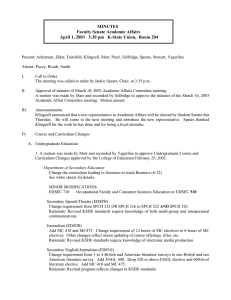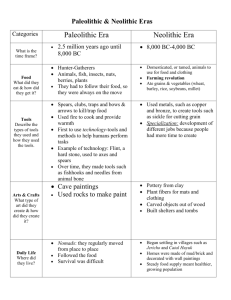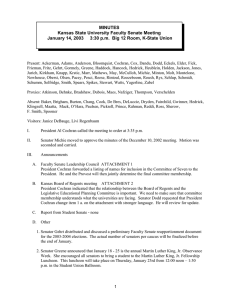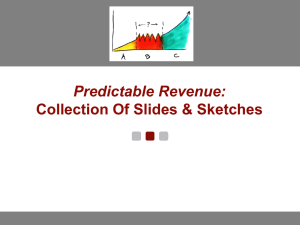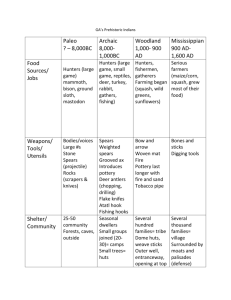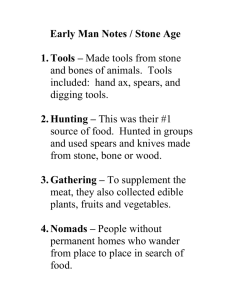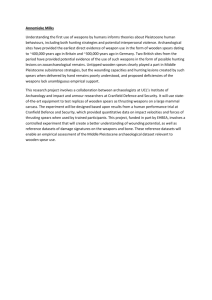Minutes Kansas State University Faculty Senate Academic Affairs Meeting
advertisement
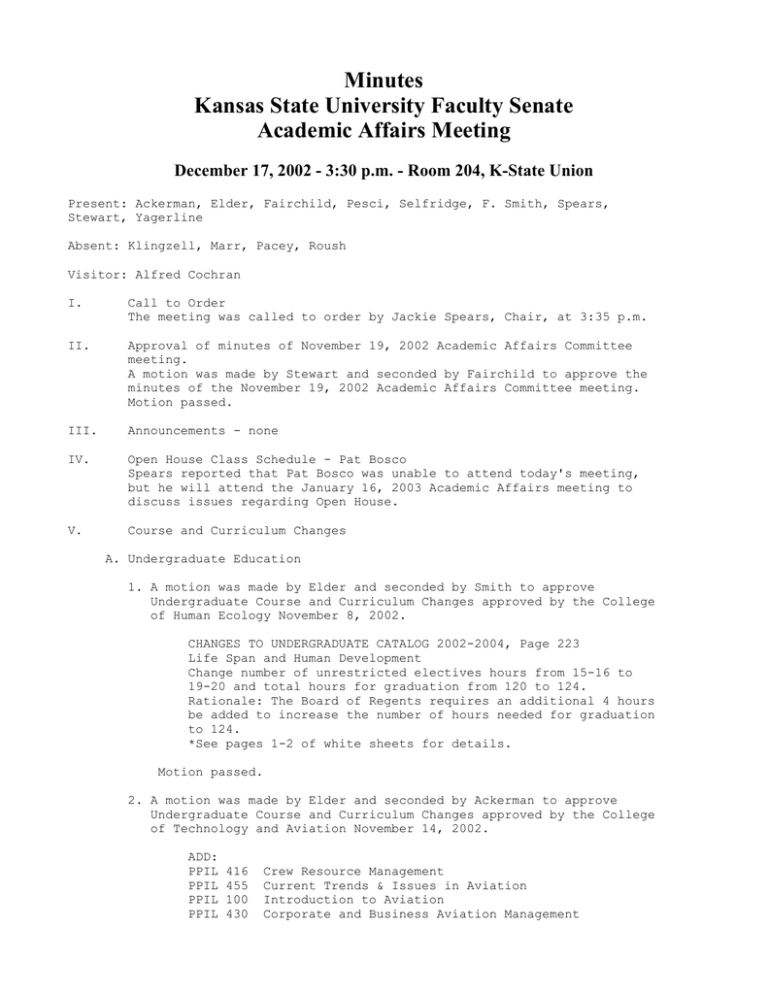
Minutes Kansas State University Faculty Senate Academic Affairs Meeting December 17, 2002 - 3:30 p.m. - Room 204, K-State Union Present: Ackerman, Elder, Fairchild, Pesci, Selfridge, F. Smith, Spears, Stewart, Yagerline Absent: Klingzell, Marr, Pacey, Roush Visitor: Alfred Cochran I. Call to Order The meeting was called to order by Jackie Spears, Chair, at 3:35 p.m. II. Approval of minutes of November 19, 2002 Academic Affairs Committee meeting. A motion was made by Stewart and seconded by Fairchild to approve the minutes of the November 19, 2002 Academic Affairs Committee meeting. Motion passed. III. Announcements - none IV. Open House Class Schedule - Pat Bosco Spears reported that Pat Bosco was unable to attend today's meeting, but he will attend the January 16, 2003 Academic Affairs meeting to discuss issues regarding Open House. V. Course and Curriculum Changes A. Undergraduate Education 1. A motion was made by Elder and seconded by Smith to approve Undergraduate Course and Curriculum Changes approved by the College of Human Ecology November 8, 2002. CHANGES TO UNDERGRADUATE CATALOG 2002-2004, Page 223 Life Span and Human Development Change number of unrestricted electives hours from 15-16 to 19-20 and total hours for graduation from 120 to 124. Rationale: The Board of Regents requires an additional 4 hours be added to increase the number of hours needed for graduation to 124. *See pages 1-2 of white sheets for details. Motion passed. 2. A motion was made by Elder and seconded by Ackerman to approve Undergraduate Course and Curriculum Changes approved by the College of Technology and Aviation November 14, 2002. ADD: PPIL PPIL PPIL PPIL 416 455 100 430 Crew Resource Management Current Trends & Issues in Aviation Introduction to Aviation Corporate and Business Aviation Management PPIL PPIL PPIL PPIL 445 295 216 214 Aviation Law Tailwheel Transition Altitude Chamber Extended Cross Country PPIL 215 PPIL 230 PPIL 231 Mountain Flying Private Pilot Glider Transition Commercial Pilot Glider Transition CHANGES: PPIL 420 PPIL 415 Advanced Aerodynamics to: PPIL 386 Aerodynamics Human Factors to: PPIL 415 Human Factors in Aviation CURRICULUM MODIFICATION: **Delete text in brackets [ ] [(AWSPP)] (PPILB)Bachelor of Science in Aeronautical Technology [(Airway Science)] Professional Pilot [(AWSPP)] (PPILB) Changes in courses required for degree. Rationale: These changes are part of a comprehensive revision of the PPIL and AWSPP curricula, in anticipation of applying for accreditation by the Council on Aviation Accreditation. *See pages COTA 7 - COTA 9 of white sheets for details. CURRICULUM MODIFICATION: Associate of Technology Professional Pilot Degree Changes in courses required for degree. Rationale: These changes are part of a comprehensive revision of the PPIL and AWSPP curricula, in anticipation of applying for accreditation by the Council on Aviation Accreditation. *See pages COTA 10 - COTA 11 of white sheets for details. Motion passed. 3. A motion was made by Stewart and seconded by Elder to approve undergraduate course and curriculum changes approved by the College of Engineering November 22, 2002. There was discussion about dropping English Composition II from the curriculum. Spears said she would get clarification from the department and e-mail Academic Affairs members the answer. Architectural Engineering DROP: ARE 523 Timber Structures ADD: ARE 522 Loading and Stability of Structures CHANGES: ARE 524 Theory of Structure II to: ARE 524 Steel Structures ARE 528 Theory of Structures III to: ARE 528 Reinforced Concrete Structures CURRICULUM CHANGES: Change curriculum total credit hour requirements for graduation from 162 to 158. Rationale: This effort is to revise and improve the graphics offerings from Architecture that are required by our students. In addition, English Composition II is only required as a prerequisite for Written Communication for Engineers for a small percentage of the students in the program. It also creates an opportunity to reduce the required credit hours in the program. *See pages 5-8 of the white sheets for details. Construction Science and Management CHANGES: CNS 321 Construction Techniques and Detailing CNS 330 Site Construction CURRICULUM CHANGES: Change curriculum total credit hour requirements for graduation from 134 to 130. Rationale: This effort is to revise and improve the graphics offerings from Architecture that are required by our students. In addition, English Composition II is only required as a prerequisite for Written Communication for Engineers for a small percentage of the students in the program. It also creates an opportunity to reduce the required credit hours in the program. *See pages 6, 9, and 10 of the white sheets for details. Computing and Information Sciences CHANGES: CIS 200 Fundamentals of Software Design and Implementation CIS 209 C/C++ Programming for Engineers to: C Programming for Engineers ADD: CIS 105 Introduction to Computer Programming CIS 111 Fundamentals of Computer Programming CURRICULUM CHANGES: IS Curriculum ADD: CIS/PHIL 492, 3 hours Rationale: CIS/PHILO 492, Computers and Society, covers ethical and social issues that are important for Information Systems majors to understand. ADD: Free elective, 1 hour Rationale: This addition, together with that if CIS 492, brings the total number of credit hours to 124-hour minimum mandated by the Board of Regents. *See pages 14-16 of white sheets for details. CS Curriculum: Add: Free Elective, 4 hours Rationale: This brings the total number of credit hours to the 124-hour minimum mandated by the Board of Regents. *See pages 14, 17, and 18 of white sheets for details. Electrical and Computer Engineering CURRICULUM CHANGES: From: General education humanities or general education social sciences electives are to be selected from university general education courses that are also on the engineering humanities and social science elective list and need not be taken in the order listed I the curriculum. To: Humanities and Social Sciences (H&SS) electives must be from the official College of Engineering University General Education (UGE) H&SS list. Students may transfer up to 6 hours of H&SS courses if not needed to meet UGE requirements. Rationale: the statement change regarding Humanities and Social Science electives is changed to make it clear that Transfer students can transfer in H&SS electives when they are not needed to meet the University General Education (UGE) requirements. *See pages 19-21 of white sheets for details. Computer Engineering CURRICULUM CHANGES: From: General education humanities or general education social sciences electives are to be selected from university general education courses that are also on the engineering humanities and social science elective list and need not be taken in the order listed I the curriculum. To: Humanities and Social Sciences (H&SS) electives must be from the official College of Engineering University General Education (UGE) H&SS list. Students may transfer up to 6 hours of H&SS courses if not needed to meet UGE requirements. Rationale: the statement change regarding Humanities and Social Science electives is changed to make it clear that Transfer students can transfer in H&SS electives when they are not needed to meet the University General Education (UGE) requirements. *See pages 19, 22, and 23 of white sheets for details. Motion passed. 4. A motion was made by Elder and seconded by Yagerline to approve undergraduate course and curriculum changes approved by the College of Education November 26, 2002. Secondary Education Changes to the curriculum leading to licensure to teach Biology (6-12) *See 1st page of white sheets for details. Changes to the curriculum leading to licensure to teach Chemistry (6-12) *See 2nd page of white sheets for details. Changes to the curriculum leading to licensure to teach Earth/Space Science (6-12) *See 3rd page of white sheets for details. Changes to the curriculum leading to licensure to teach Physics (6-12) *See 4th page of white sheets for details. Changes to the curriculum leading to certification in Physical Sciences (7-12) *See 5th page of white sheets for details. Motion passed. B. Graduate A motion graduate December Education was made by Yagerline and seconded by Fairchild to approve course and curriculum changes approved by Graduate Council 3, 2002. Spears mentioned that AGRON 901 should be "Environmental Instrumentation" instead of "Environmental Instruction" and ART 611 should be "Digital Photography and Advanced Techniques" instead of "Digital Photography and Advanced." CHANGE AGEC 825 AGRON 645 AGRON 900 AGRON 901 ART 611 ART 615 ART 620 ART 650 ASI 801 CS 726 HN 701 LAR 646 LAR 648 LAR 744 DROP ASI 605 BIOL 755 PLPTH 760 PLPTH 930 NEW AGEC 880 AGEC 925 AGRON 646 ART 649 ART 653 CHM 920 CS 746 LAR 655 LAR 656 LAR 700 Natural Resource Policy Soil Microbiology Biometeorology Environmental Instrumentation Digital Photography and Advanced Techniques Figure Painting Water Media II Advanced Painting Studio Hormonal Control of Reproduction Clinical Externship and/or Programmed Study Sensory Analysis Landscape Architecture Design Studio V Landscape Architecture Design Studio VI Community Planning and Design Fresh Meat Operations Specialized Cell Functions Plant Pathology Methods Genome Analysis Agribusiness Industry Structures Advanced Resource and Environmental Economics Soil Microbiology Laboratory Painting Seminar Senior Painting Studio Analytical Separations Clinical Equine Theriogenology Land Arch Internship, Part A Land Arch Internship, Part B Project Programming Motion passed. C. General Education VI. - none Old Business A. Course and Curriculum Changes 1. On-line form filler/paper format 2. Format for Course and Curriculum Changes Spears said there was nothing to report on these items. B. Academic definitions Spears said there was nothing new to report. C. Credit hour requirements for graduating with honors Spears said there was nothing new to report. D. Proposed change to Section F in University Handbook Spears reported that students brought forward a request to change the language in Section F of the University Handbook. At the last meeting, the committee decided it would be better to write a good version and move more slowly. The old policy specifies that there should be no tests or papers due five calendar days before finals. The students want that to be changed to having no tests or papers due seven calendar days before finals. They also want the Friday before that week to be a stop day. The policy already states that faculty are not to give tests or have papers due during the week before finals. Pesci said that it hurts the faculty that follow the guidelines when others don't follow the rules. Spears said that perhaps students should get a hotline to report faculty that don't comply to the rules. She has talked to Student Senate about establishing a way for students to report faculty that do not comply to the rules. This issue will be discussed further at the next meeting. VII. New Business A. A motion was made by Stewart and seconded by Yagerline to approve additions to graduation lists. May 2002 Russell Essman, Technology and Aviation, BS - Airway Science, Professional Pilot degree code U1 Jonathan E. Howard, Arts & Sciences, Bachelor of Fine Arts - Fine Arts-IL May 2001 Jaime L. Richecky, Business Administration, BS in Business Administration - Accounting Motion passed. B. A motion was made by Selfridge and seconded by Fairchild to approve granting of a posthumous degree for past College of Arts and Sciences student requested by Stephen White, Dean of Arts and Sciences. Mary Legohn Griffin, Arts and Sciences, BS - Social Science Motion passed. C. Summer School Schedule Spears distributed the web version of the Summer School Class Time Schedule. This item is on CAPP's agenda in January and they will be meeting with administrative personnel. One the problems is that there are different length of sessions and students have conflicts with scheduling classes. Spears had suggested that eight-week courses meet in the morning and the other length sessions meet in the afternoon, but CAPP was not in favor of that idea. Selfridge suggested that departments could be advised to set their classes up that way and it may help students. Six-week courses cause the most conflict. Smith suggested that if the six-week sessions (60-minute classes) were eliminated, it solved most of the conflicts since many of their times overlap with the 80-minute and 120-minute sessions. Spears said she would check on this suggestion with CAPP. Stewart said we do need to accommodate schedules and people's needs. Spears said that a problem brought up by department heads is that the policy requires classes to meet five days/week. Some faculty would rather teach three days each week and meet for a longer time; they do not want to teach every day. Some department heads said they would have trouble recruiting faculty to teach if there is not more flexibility. Selfridge said that teaching five times/week does not fit in some faculty's schedules. It would be appropriate for Academic Affairs to figure out ways of gathering data regarding the interest/concerns of faculty and see how many faculty it creates problems for. Pesci said that students are the customers and that we need to see how many credit hours they want to take during the summer and how that plays into the mix. Smith said that in Business Administration, some students try to take eighteen hours during the summer and get burned out. Selfridge asked Ackerman if there are problems with summer school scheduling in Salina. Ackerman said that six-week sessions work well there. There are two six-week sessions there with more students attending the first session. Spears said she would make sure CAPP is aware of this. Spears asked Academic Affairs members to share the Summer School Schedule Policy with their colleges and get as much input as possible before work is started to revise the policy. The website for this document is: http://www.ksu.edu/facsen/policies/summer.htm VIII. Committee Reports A. Pesci report on General Education Council Pesci reported that the General Education Council has met three times in the last three weeks. They are meeting this Friday for the second round of looking at UGE classes approved six years ago. There are 42 classes to look at, with 7 - 8 classes being problematic. Many of the UGE classes are not being taught by the original instructor that set up the guidelines for the class. The General Education Council are getting comments from faculty that are not happy with UGE. Due to budget cuts, they may not be able to have teaching assistants to help them with classes. Pesci said that the council is working on a boilerplate statement that would be sent to faculty saying that this a UGE class and this is what you find in it. Spears reported that an Assessment Committee for UGE is being created. David Byrne is working on this project. Writing assignments in capstone courses may be used to evaluate UGE. Spears said she will wait to appoint members to the established assessment group and see if a new assessment committee is created. B. Elder report on University Library Committee Elder reported that the University Library Committee will not meet in December and may not meet in January. C. Spears report on Committee on Academic Policy and Procedures (CAPP) Spears said she was unable to attend the last CAPP meeting due to it being moved at the last minute and she couldn't find where they were meeting. She did catch up with the group at the luncheon and was able to report on Academic Affairs' activities. IX. For the Good of the University Yagerline mentioned that Don Foster, University Registrar was going into phased retirement and asked if we would see any changes. Spears said that there will probably not be any short-term changes, but we may see long-term changes. Elder mentioned the memo that the Provost sent out November 13, 2002 to deans that lists degree programs that fail to meet or just meet BOR requirements. Spears said that there are serious discussions taking place about the reassessment of faculty loads. The document is also supposed to help deans with planning for cuts. It is not a hit list but the information is there to integrate into budget plans. X. Adjournment Meeting adjourned at 4:40 p.m.
